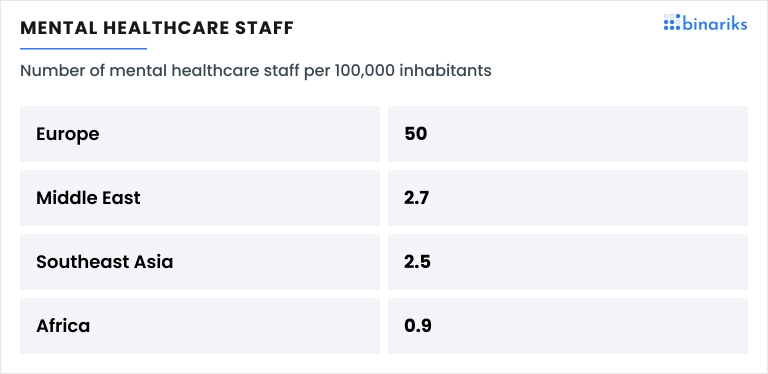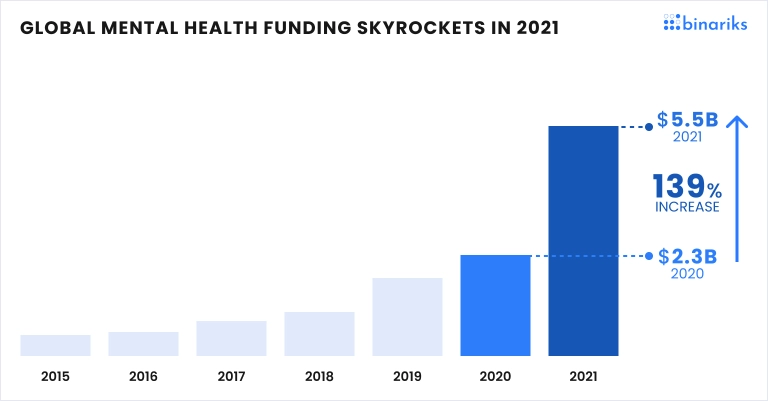AI for mental health has emerged as a revolutionary force in addressing mental well-being challenges. As societies continue to recognize the importance of mental health, the need for new and successful solutions is growing.
In this context, integrating artificial intelligence offers a promising avenue to transform mental health care. With its potential to enhance diagnosis, treatment, and support, AI is a beacon of hope for individuals seeking comprehensive and personalized services. Advanced algorithms and data analysis improve pattern recognition, problem anticipation, and customized interventions.
However, while the rise of AI in mental health holds immense promise, it also raises crucial ethical and practical questions. So it is very important to ensure the right balance between technological progress and human interaction. In this article, we delve into the diverse applications, benefits, and challenges of AI in mental health.
Understanding mental health care challenges
According to the World Health Organization (WHO):
- Globally, 1 out of every 4 people will be impacted by poor mental health or mental illness at some point.
- 350 million people worldwide suffer from depression.
- Each year, an estimated 800,000 people take their own lives – almost twice the number of people killed by malaria.
- Suicide is the second highest cause of death among 15 to 29-year-olds. Percentages are especially high among girls and young women.
- Almost 9 out of 10 people with a mental condition experience stigma and discrimination.
- In high-income countries, 5 out of 10 people cannot access the necessary psychological care. This number rises to 9 out of 10 people in low- and middle-income countries (Source ).
Disasters and conflicts
Amid disasters and conflicts, mental health emerges as a silent casualty. The World Health Organization (WHO) reveals that a staggering 20% of those affected require psychosocial support. Today, more than 70 million people are displaced due to violence and conflict, marking the highest displacement since World War II.
Mental health challenges tend to linger longer in these crisis contexts, fueled by sustained stress and inadequate support systems. These issues impede personal well-being and hinder social and economic reconstruction.
Economic challenges
The cost of poor mental health reverberates across the global economy, exacting an estimated $2.5 trillion annually through diminished productivity and physical health challenges. This daunting figure is projected to surge to $6 trillion by 2030, alongside social burdens, poverty, homelessness, and crime.
Startlingly, mental illness is anticipated to contribute over half of the economic disease burden over the next two decades, surpassing cancer, diabetes, and chronic respiratory ailments combined.
From 2000 to 2015, charitable organizations accounted for approximately 30% of all development funding earmarked for mental healthcare. Despite progress, the gap between the importance of mental health and the allocation of resources remains a pivotal challenge on the road to comprehensive global well-being.
AI as a solution
One of the most significant challenges in addressing this crisis is the shortage of mental health professionals. In many parts of the world, individuals face barriers to accessing timely and appropriate care due to this scarcity.
This is where AI-based mental health solutions and AI-driven mental health platforms come into play as transformative tools. These innovations have the potential to bridge the gap between the demand for mental health services and the limited supply of professionals.

By harnessing the capabilities of AI for mental healthcare, the sphere can evolve to better address the challenges at hand. These technological advancements have the potential to democratize mental health care, ensuring that individuals worldwide have access to timely support and resources, even in the face of a shortage of mental health professionals.
5 applications of AI in mental health
In the dynamic intersection of artificial intelligence and mental health, transformative advancements are reshaping the way we approach and manage psychological well-being. The field of mental health care offers new avenues for early detection, personalized interventions, and therapeutic support.
Here are five examples of AI for mental health that showcase the potential of technology to enhance mental well-being on multiple fronts.
1. Early detection using machine learning
Artificial intelligence plays a crucial role in identifying potential mental health issues at an early stage. Machine learning algorithms analyze vast amounts of data, such as social media posts, speech patterns, and digital interactions, to detect subtle changes indicative of conditions like depression or anxiety.
Natural language processing (NLP) and sentiment analysis are key technologies used in this process.
2. Diagnostic support with natural language processing
AI-driven natural language processing assists mental health professionals in diagnosing and assessing patients.
NLP algorithms can detect linguistic cues and emotional nuances by analyzing text or speech, aiding in more accurate assessments. Conversational agents powered by NLP, often called chatbots, engage users in conversations to evaluate their mental state, providing valuable insights to clinicians.
3. Virtual reality therapy for trauma and anxiety
Virtual reality (VR) technology coupled with AI offers immersive therapeutic experiences for individuals dealing with trauma or anxiety. AI algorithms create dynamic scenarios that expose patients to controlled stressors, helping them confront and manage their psychological distress.
This immersive exposure therapy enables individuals to develop coping mechanisms within a safe environment.
4. Personalized treatment plans through data analysis
AI leverages patient data to formulate personalized treatment plans.
Machine learning algorithms process a range of information, including genetics, medical history, lifestyle, and treatment responses. By analyzing this data, AI can suggest tailored interventions, optimizing the effectiveness of treatment strategies. Predictive analytics and data mining are key components of this application.
5. AI-powered mental health education
AI-driven education tools are transforming mental health awareness and knowledge dissemination. Chatbots equipped with AI provide accessible information, coping strategies, and self-help resources to individuals seeking guidance.
Additionally, AI-driven platforms assist mental health professionals in staying updated with the latest research, therapies, and practices, ensuring the delivery of high-quality care.
These applications of AI in mental health exemplify how technology is reshaping the landscape of mental health care, enhancing both prevention and treatment approaches. By harnessing the potential of AI, mental health professionals and individuals alike are equipped with innovative tools to address the complexities of mental well-being.
Will adopting GenAI mark the next chapter for your business?
Download our free whitepaper now to find out.

Mental health illnesses that can be treated with AI
The integration of AI and mental health holds promise across a spectrum of mental health conditions, offering innovative solutions that cater to diverse needs. According to the State of Mental Health Tech 2021 Report, global deals and dollars to mental health tech startups reached new highs (Source ).

And here are several application areas with great potential.
- Depression
Artificial intelligence (AI) is rapidly transforming the landscape of depression management, addressing critical statistics and challenges.
According to the National Institute of Mental Health (NIMH), major depressive disorder is one of the most common mental health conditions in the US. Despite its prevalence, a Substance Abuse and Mental Health Service Administration (SAMHSA) report reveals that only 63% of adults and a mere 40% of teenagers with major depressive episodes receive any form of treatment.
AI-powered applications bridge this treatment gap by offering accessibility and responsiveness. They operate 24/7, collecting user data to tailor therapy and provide real-time feedback.
Privacy and anonymity are significant advantages, especially in reducing the stigma surrounding mental health. While AI doesn't replace clinical treatment, it complements it by offering discreet, convenient, and accessible support (Source ).
- Anxiety
Anxiety, a pervasive mental health condition affecting an estimated 19% of people globally in 2020, often disrupts daily life for extended periods. This condition imposes a substantial economic burden and leads to significant years of healthy life lost due to illness. Moreover, anxiety is a prominent risk factor for suicide.
Alarmingly, there are only about 9 psychiatrists per 100,000 people in high-income countries and merely 0.1 per 1 million people in low-income countries, leaving a considerable gap in mental health care accessibility.
In response to these challenges, the use of wearable AI has gained popularity. Special smartwatches and glasses can continuously collect and analyze physiological data in real-time. Parameters such as heart rate, physical activity, and sleep patterns are monitored, offering valuable insights into anxiety symptoms.
Wearable AI holds significant promise for early and precise anxiety diagnosis, enabling personalized treatment and preventive measures (Source ).
- Schizophrenia
With the absence of objective diagnostic tests, the traditional clinical evaluation of schizophrenia relies on observed symptoms, leading to uncertainty and variability in diagnoses.
However, AI techniques, including machine learning and deep learning, offer an objective and evidence-based approach to enhance the accuracy of diagnosis. AI can predict the risk of conversion to psychosis in individuals experiencing the prodromal phase with an impressive accuracy rate of approximately 30% within a 3-year follow-up period.
Beyond diagnosis, AI transforms the management of schizophrenia. It can distinguish patients from healthy controls based on brain volume changes, providing diagnostic support.
AI-driven avatars and virtual reality therapy improve medication adherence and offer therapeutic interventions. Machine learning methods assess treatment response, compliance, and adherence to antipsychotic treatments, leading to individualized and effective treatment plans.
Furthermore, AI is used to identify violent behavior in patients with schizophrenia using neuroimaging data, enhancing safety measures (Source ).
Benefits of AI in healthcare: All you need to know
Benefits of AI in mental health
Integrating AI solutions for mental health heralds a new era of possibilities. One of the main advantages is the level of personalized care. Artificial intelligence's capacity to process vast amounts of data empowers mental health professionals to craft tailored treatment plans. By factoring in variables such as genetics, lifestyle, and treatment responses, AI ensures that interventions are precisely aligned with individual needs, fostering efficacy and optimizing outcomes.
Moreover, the accessibility quotient receives a substantial boost with the infusion of artificial intelligence in mental health.
Virtual therapists and AI-driven chatbots transcend geographical boundaries, making mental health resources available globally. This democratization of care offers timely support and interventions to those who might otherwise face barriers due to location or limited mental health infrastructure.
AI's vigilant monitoring capabilities, often paired with wearable devices, facilitate real-time tracking of mental health trends, enabling early intervention and preventive measures.
Challenges and considerations
Incorporating AI in mental healthcare holds transformative potential, yet it is not devoid of challenges and intricate considerations that demand careful navigation.
- Data privacy and security: As AI systems process many sensitive patient data, concerns about data privacy and security loom large. Striking a delicate balance between leveraging data for effective interventions and safeguarding patient confidentiality necessitates robust measures to prevent unauthorized access and breaches.
- Bias and fairness: According to Forbes, using AI for mental health treatment introduces the potential for bias and fairness issues. Biased training data can inadvertently perpetuate disparities, highlighting the need for diverse and representative datasets. Vigilant efforts to ensure fairness and accuracy in algorithmic predictions are essential to mitigate these concerns (Source ).
- Balancing human touch and automation: While AI-driven interventions offer scalability and efficiency, the intricate nature of mental health care often demands a human touch. The challenge lies in striking a harmonious equilibrium between automated support and the empathetic connection that human interaction provides, ensuring holistic and effective treatment.
In the pursuit of maximizing the potential of AI in mental healthcare, it is important to address these challenges systematically. By proactively addressing data privacy, mitigating bias, preserving human connection, and adhering to ethical considerations, the field can harness AI's power while upholding the integrity and sensitivity essential to effective mental health care.
Take your software to new heights with AI solutions and machine learning
Binariks as an AI implementation leader
Binariks stands at the forefront of transforming ideas into functional and impactful software applications. Backed by a team of professionals, we possess a wealth of expertise in developing software solutions tailored to the unique needs of our clients.
In particular, we provide comprehensive assistance with both implementing AI/ML technologies (like NLP, generative AI, speech recognition, deep learning, predictive maintenance, and more) and their efficient integration into businesses across various industries, including healthcare. Explore how Binariks can drive innovation in your industry.
Contact us today, and let's collaborate on turning your ideas into reality.
Future directions
In conclusion, the dynamic potential of AI in behavioral health promises a transformative path forward. With personalized interventions, global accessibility, and proactive support, AI stands as a beacon for a future where technology and empathy synergize to nurture mental wellness through the use of AI for mental health.
The fusion of AI with emergent technologies like Virtual Reality (VR) and portable devices augments this trajectory. VR's immersive experiences enable exposure therapy, while AI-integrated portable devices empower proactive self-care. This fusion of technologies exemplifies a holistic and impactful approach to mental health care, emphasizing the pivotal role of AI in enriching the pursuit of well-being.
FAQ
Share

